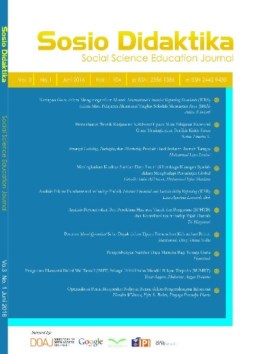PENGARUH KECERDASAN EMOSIONAL DAN MODAL SOSIAL TERHADAP KEMANDIRIAN BELAJAR SISWA DALAM PEMBELAJARAN IPS
DOI:
https://doi.org/10.15408/sd.v4i2.7987Keywords:
Emotional Intelligence, Social Capital, Self-Regulated Learning.Abstract
The study aims to measure and analyze the influence of emotional intelligence and social capital towards self-regulated learning. This study used a quantitative approach and survey method. The samples are 400 students from 16 Junior High Schools grade 8th in West Bandung regency. The research used stratified random sampling. The results showed that emotional intelligence and social capital positive and significant impact on student’ self regulated learning. The influence of emotional intelligence was 0,447, or 20% toward self regulated learning, while the remaining (80%) was influenced by other factors. The influence of social capital was 0.232 or 5.4%, toward self regulated learning, while the remaining (94.6%) was influenced by other factors. Simultaneously, the emotional intelligence and social capital influenced 33.2% toward self regulated learning and the remaining (66.8%) was influenced by other factors. In this study the variables of emotional intelligence has the most impact on self regulated learning. The implication showed that the student’s self regulated learning could be enhanced by increasing the students’ emotional intelligence and social capital.References
Alma, B. 2010. Pembelajaran Studi Sosial. Bandung: Alfabeta.
Bandura, A. 1971. Social Learning Theory. New York: General Learning Press. [Online]. Tersedia: http://www.jku.at/org/
Banks,J.A.& Clegg Jr, A. 1990. Teaching Strategies for the Social Studies: Inquiry, Valuing and Decision-Making, fourth edition. New York: Longman.
Barliana, M.S dan Maryani, E. 2008. Kontribusi Lingkungan Binaan dan Perilaku Spasial terhadap Modal Sosial Komunitas Penghuni dan Implikasinya bagi Pendidikan IPS. Jurnal Mimbar Pendidikan, Vol XXXII, No.2. Bandung: Universitas Pendidikan Indonesia
Bolino, M.C., W.H. Turnley & J.M. Bloodgood. 2002. Citizenship Behavior and the Creation of Sosial Capital. Academy of Management Journal, 17 4: 505-540. (Online). Tersedia: http:// faculty-staff-ou.edu. [29 Januari 2014].
Chabib, T. 1996. Kapita Selekta Pendidikan Islam. Yogyakarta: Pustaka Pelajar.
Cohen, D & L, Prusak. 2001. In Good Company. How sosial Capital Makes Organizations Work. Boston, MA: Harvard Business Scool Press.
Coleman, J.S. 1994. Foundations of Sosial Theory. Belknap Press, Cambridge, Mass: Harvard University Press.
-------------. 2010. Dasar-dasar Teori Sosial; Foundations of Sosial Theory. Jakarta: Nusamedia.
De Bruin, A.B., Thiede, K.W., & Camp, G. 2001. Generating keywords improves metacom-prehension and self-regulation in elementary and middle school children. Journal of Experimental Child Psychology, 109 (3), 294-310.
Engkoswara. 1987. Dasar-Dasar Administrasi Pendi-dikan. Jakarta: Depdikbud.
Goleman, 1995. Emotional Intelligence. New York: Scientific American.
-----------, 2000. Emotional Intelligence. Jakarta: PT Gramedia Pustaka Utama.
Harris, K. R., Friedlander, B.D., Saddler, B., Frizzelle, R. & Graham, S. 2005. Self-monitoring of attention versus self-monitoring of academic performance: Effects among students with ADHD in the general education classroom. Journal of Special Education, 39 (3), 145-156.
Hasbullah, J. 2006. Sosial Capital (Menuju Keunggulan Budaya Manusia Indonesia). Jakarta: MR-United Press Jakarta.
Jarvela, S., & Jarvenoja, H. 2011. Socially constructed self-regulated learning and motivation regulation in collaborative learning groups. Teachers College Record, 113(2), 350-374.
Maryani, E dan Syamsudin, H. 2009. Pengem-bangan Program Pembelajaran IPS Untuk Meningkatkan Kompetensi Keterampilan Sosial. Jurnal Penelitian Vol. 9 No. 1. Bandung
Mu’tadin, Z. 2002. Pengantar Pendidikan dan Ilmu Perilaku Kesehatan. Yogyakarta: Andi Offset.
Mutakin, A. 2008. Individu, Masyarakat dan Perubahan Sosial. Bandung: Universitas Pendidikan Indonesia.
Shahib, M.N. 2010. Pembinaan Kreativitas Anak Guna Membangun Kompetensi. Bandung: PT Alumni.
Shapiro, L.E. 1998. Mengajarkan Emotional Intelligence. Jakarta :PT Gramedia Pustaka Utama.
Soewandi. 1993. Penyebab Gangguan Jiwa Manusia. Yogyakarta: Laporan Penelitian Dosen UGM (tidak diterbitkan)
Suharsono. 2000. Mencerdaskan anak. Jakarta: Inisiasi Press.
Surya, M. 2014. Psikologi Guru; Konsep dan Aplikasi dari Guru untuk Guru. Bandung: Alfabeta.
Thornburg, H.D. 1982. Development in Adolescence. Monterey, California: Brooks/Cole Publishing Company.
Wolters, C.A. 2011. Regulation of motivation: Contextual and social aspects. Teachers College Record, 113(2), 265-283


